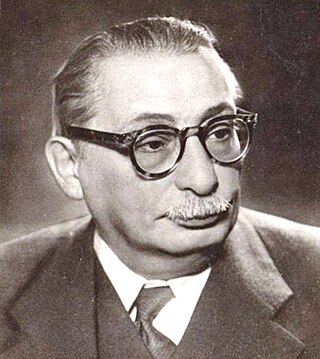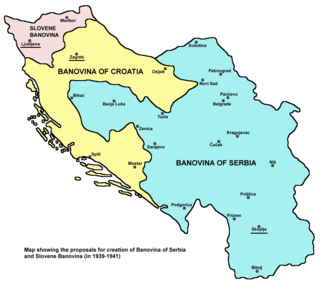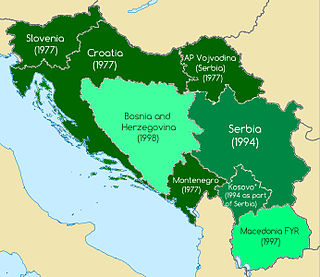Related Research Articles

Petar II Petrović-Njegoš, commonly referred to simply as Njegoš (Његош), was a Prince-Bishop (vladika) of Montenegro, poet and philosopher whose works are widely considered some of the most important in Montenegrin and Serbian literature.

Milovan Djilas was a Yugoslav communist politician, theorist and author. He was a key figure in the Partisan movement during World War II, as well as in the post-war government. A self-identified democratic socialist, Djilas became one of the best-known and most prominent dissidents in Yugoslavia and all of Eastern Europe. During an era of several decades, he critiqued communism from the viewpoint of trying to improve it from within; after the revolutions of 1989 and the violent breakup of Yugoslavia, he critiqued it from an anti-communist viewpoint of someone whose youthful dreams had been disillusioned.
Sir Noel Robert Malcolm, is an English political journalist, historian and academic, currently a Senior Research Fellow at All Souls College, Oxford. A King's Scholar at Eton College, Malcolm read history at Peterhouse, Cambridge, and received his doctorate in history from Trinity College, Cambridge. He was a Fellow and College Lecturer of Gonville and Caius College, Cambridge, before becoming a political and foreign affairs journalist for The Spectator and the Daily Telegraph.

Moša Pijade, nicknamed Čiča Janko was a Serbian and Yugoslav communist, a close collaborator of Josip Broz Tito, Yugoslav politician, and full member of the Serbian Academy of Sciences and Arts.

Vladimir Dedijer was a Yugoslav partisan fighter during World War II who became known as a politician, human rights activist, and historian. In the early postwar years, he represented Yugoslavia at the United Nations and was a senior government official.

The Battle of Mojkovac was a World War I battle fought between 6 January and 7 January 1916 near Mojkovac, in today's Montenegro, between the armies of Austria-Hungary and the Kingdom of Montenegro. It ended with a decisive Montenegrin victory.

The war crimes and crimes against humanity which were perpetrated by the Soviet Union and its armed forces from 1919 to 1991 include acts which were committed by the Red Army as well as acts which were committed by the country's secret police, NKVD, including its Internal Troops. In many cases, these acts were committed upon the orders of the Soviet leaders Vladimir Lenin and Joseph Stalin in pursuance of the early Soviet government's policy of Red Terror. In other instances they were committed without orders by Soviet troops against prisoners of war or civilians of countries that had been in armed conflict with the USSR, or they were committed during partisan warfare.

The Music Man is a 2003 American made-for-television musical film directed by Jeff Bleckner with a teleplay by Sally Robinson. It is based on the 1957 musical of the same name by Meredith Willson, which in turn was based on a story by Willson and Franklin Lacey. The film stars Matthew Broderick and Kristin Chenoweth and features David Aaron Baker, Debra Monk, Victor Garber, and Molly Shannon. It was originally broadcast on ABC on February 16, 2003, as the eleventh episode of the forty-seventh season of The Wonderful World of Disney.
Li Shenzhi was a prominent Chinese social scientist and public intellectual. Long a trusted spokesperson of the Chinese Communist Party, he rose to become Vice-President of the Chinese Academy of Social Sciences.
Vladimir Đilas is a Serbian football forward who plays for Brodarac.

Adil Zulfikarpašić was a Bosnian intellectual and politician who served as vice president of the Republic of Bosnia and Herzegovina, during the Bosnian War of the 1990s, under the first president of the Presidency of the Republic of Bosnia and Herzegovina Alija Izetbegović. After the war he retired from politics and opened the Bosniak Institute, a museum in Sarajevo focused on the Bosniak culture.

Dmitriy Manuilsky, or Dmytro Zakharovych Manuilsky was an important Bolshevik revolutionary, Soviet politician and academic who was Secretary of the Executive Committee of Comintern, the Communist International, from December 1926 to its dissolution in May 1943.
Đilasism refers to the Yugoslav communist politics of the influence of Yugoslav communist Milovan Đilas.

The Banovina of Serbia or Banate of Serbia, officially known as "the Serbian Lands", was a proposed administrative unit of the Kingdom of Yugoslavia. Its creation was proposed after the establishment of the Banovina of Croatia in 1939. However, due to the Axis occupation and partition of Yugoslavia in 1941, the proposal was never implemented.

Thilas was an ancient title of nobility used in the Serer pre-colonial Kingdoms of Sine, Saloum and previously the Kingdom of Baol, which are all now part of modern-day Senegal. The Thilas was the second in the order of succession to the throne after the Buumi who was the heir apparent. Only members of the royal family could hold this title. When a Maad a Sinig dies without a Buumi, the Thilas could ascend the throne at the discretion of the Great Jaraff and his Noble Council of Electors responsible for electing the kings from the royal family. In the history of Sine to its 20th century history, such an incident is only known to have occurred once, at the succession of Maad a Sinig Kumba Ndoffene Fa Ndeb Joof whose predecessor died without a Buumi.
Djilas is a village in Senegal located in the Sine-Saloum, in the west.

The Uprising in Montenegro, commonly known as the 13 July Uprising was an uprising against Italian occupation forces in Montenegro. Initiated by the Communist Party of Yugoslavia on 13 July 1941, it was suppressed within six weeks, but continued at a much lower intensity until Battle of Pljevlja on 1 December 1941. The insurgents were led by a combination of communists and former Royal Yugoslav Army officers from Montenegro. Some of the officers had recently been released from prisoner-of-war camps following their capture during the invasion of Yugoslavia. The communists managed the organisation and provided political commissars, while the insurgent military forces were led by former officers. The entire nation rejected the privileged position offered by its occupiers, rejected the capitulation in order to fight for Yugoslavia, together with "Russia".

Homosexuality in Yugoslavia was firstly decriminalized in the Socialist Republics of Croatia, Slovenia, Montenegro and the Socialist Autonomous Province of Vojvodina in 1977. In other regions anti-LGBT legislation was, to varying degrees, progressively not implemented. The capital city of Belgrade, together with Zagreb and Ljubljana, became some of the first spots of an organized LGBT movement in the Balkans.
During the implementation of the Congress of Berlin, when the Principality of Montenegro had received Plav and Gusinje, the surrounding Albanian populace under the guise of the Ottomans attacked the Montenegrin forces in Velika at two occasions, on October 9 and November 22, 1879. The Ottomans were defeated.

Velimir Terzić was a Yugoslav People's Army captain, partisan general, and historian.
References
- ↑ "Lancement de la campagne de Hammadoun Kolado Cissé" (in French). Aribone.com. 29 June 2009.
